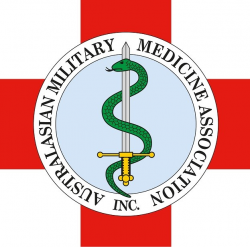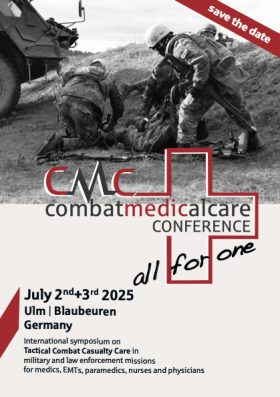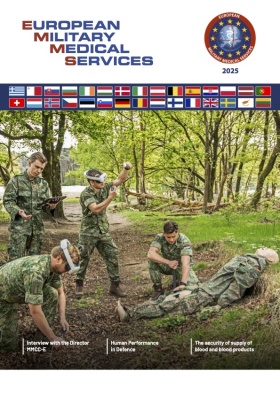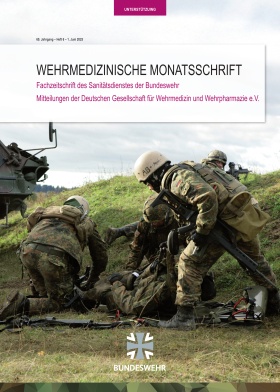
Article: Pieter H Helmhout (Ministry of Defense The Netherlands)
Health & Readiness Programs in the Netherlands Armed Forces: a pivotal role for lifestyle coaches
Context
An increasingly complex world of technological growth, ageing and scarcity of personnel emphasize the need for strengthening the armed forces personnel. In 2017, the Netherlands Armed Forces Surgeon General initiated the program Sustainable Health and Readiness (SHR), aimed at assisting service members in coping with the challenges of life and work by providing them with tools to support a healthy lifestyle, both on and off the job. On an organizational level, the program intents to shift a (military) healthcare system that focuses on injury, disease and illness, towards a system that promotes health and readiness as an integral part of the care continuum.
Methods
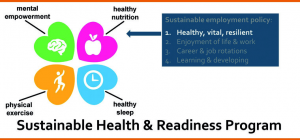
SHR focuses primarily on four topics and their interrelations (figure 1):
- nutrition,
- sleep,
- physical exercise, and
- mental empowerment (i.e., promotion of resilience and prevention of poor psychological health).
 Fig. 2: The lifestyle Coach plays a key role in the DTCS
Fig. 2: The lifestyle Coach plays a key role in the DTCS
Within SHR, civilian tools and newly developed interventions are implemented. Moreover, (health) care professionals are empowered in using health promotion. Program activities take place at the individual, team/social, and organizational level. Examples include pilots of healthy food supply in Dutch military barracks, PhD-research on stigma of mental health problems, and research on the link between oral microbiome and preventative oral health care in operational settings.
The cornerstone of SHR, however, is the introduction of a new health professional within the military: the lifestyle coach (figure 2). This certified coach can guide individuals or groups with health-related issues such as sleep deprivation, stress, or overweight. The lifestyle coach works in an integrative manner by connecting with other service support professionals, and makes use of a ‘toolbox’ with an array of mainly scientifically based interventions (e.g. sensoring, interconnected web/mobile apps, advice based on laboratory diagnosis).
Results
SHR lifestyle coaching programs are ongoing at two staff departments (total n≈1,500). Based on preliminary observations, a total of 30-40% participation rate is expected during each of the 2-year programs. Additional programs are currently being implemented at brigade level. The SHR programs are being evaluated by means of a pre-post questionnaire design and process evaluation. First results show small but significant 6-month improvements in healthy behavior (i.e., physical exercise, healthy nutrition, healthy sleep), perceived health, resilience, and work absenteeism. Figure 4 shows that the SHR program is highly appreciated by participants, with average scores (1-10) of 8,1 (overall), 8,9 (appreciation coach), and 10 (recommended to colleagues).
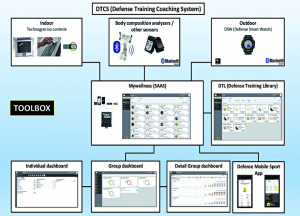 Fig. 3: DTCS (Defense Training and Coaching System) as one of the elements of the lifestyle coach toolbox has been developed by the NAF PT department and the company Technogym®. It connects smartwatches to an app, to fitness machines, to body composition analysers, and to a cloud system with data on training programs and other information. This enables the individual to be accompanied and monitored remotely by a lifestyle coach or personal trainers.
Fig. 3: DTCS (Defense Training and Coaching System) as one of the elements of the lifestyle coach toolbox has been developed by the NAF PT department and the company Technogym®. It connects smartwatches to an app, to fitness machines, to body composition analysers, and to a cloud system with data on training programs and other information. This enables the individual to be accompanied and monitored remotely by a lifestyle coach or personal trainers.
 Fig 4: Preliminary results of the first evaluation of the Health and Readiness Program
Operational Relevance
Fig 4: Preliminary results of the first evaluation of the Health and Readiness Program
Operational Relevance
Health, broadly defined as a dynamic ability to adapt and manage one’s own well-being, is considered a prerequisite for the sustainable employability of service members. By providing health promotion tools at different organizational levels, service members are supported to develop skills to improve health and readiness to better cope with their social and operational context.
Date: 08/18/2020
Source: Wehrmedizinische Monatsschrift 08/2020






